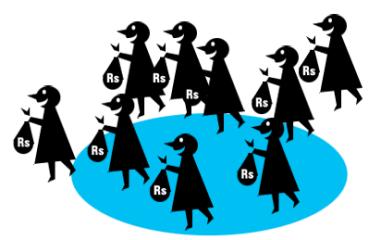 | « Back to article | Print this article |

Saving is not the same as investing, as many people wrongly assume. But what's the difference between the two? How does each benefit you. Larissa Fernand has the answers
I save a lot. Is that not the same as investing?
The two terms saving and investing are often used interchangeably. So it is natural, but erroneous, to conclude that they mean the same thing.
Saving and investing are intertwined and correlated but not good proxies for each other. They are two different efforts.
Saving is when you do not spend a part of your income but set it aside for future use. Generally, savings is viewed as risk free. When money is put aside in a 'safe place', it is viewed as savings -- savings account or bank deposits are classic examples.
Investing is putting those savings to work. It involves committing your money into an investment vehicle with the hope of making a financial gain. In this sense, investing involves taking some risk with your savings.
You don't create wealth purely by saving. You have to invest the savings correctly to do so. And you cannot invest if you do not save, unless you are one of those fortunate enough to have inherited huge sums of money.
What investing is supposed to do is give you a higher return once you take tax and inflation into account. Your money in a fixed deposit and savings account will be subject to tax and its value will erode rapidly due to inflation. In fact, you could end up with a negative return if the inflation rate is higher than the return on a savings bank account.
Ashu Suyash, chief executive officer at L&T Mutual Fund, explains this in 'Retirement and Financial Planning', a note she penned for the India Markets Observer.
Let's take an example of a person who has invested Rs 1 lakh in March 1980. His investment would have grown to Rs 2.14 crore by December 2014 if invested in equity, Rs 19 lakh in gold and Rs 22 lakh if invested in fixed deposits (All figures are approximates). This is the wealth generation potential of equity which has delivered exceptional returns of over 16 per cent per year during this period.
The point being made is that not only has equity given the highest return, it has beaten inflation and long-term capital gains is nil too, so there is no tax to be paid.
The savings rate in our country is high, but not all of it is invested. Domestic saving as percentage to GDP was 30.1 per cent in FY13. Though still high, it has declined from 36.8 per cent in FY08.
Rajiv Bajaj, vice chairman and managing director of Bajaj Capital, noted that in the last five years ended 2012/13, only 742 billion rupees of household savings has flown into capital markets, constituting only 1.5 per cent of total household financial savings, 0.6 per cent of gross domestic saving and 0.19 per cent of GDP.
He believed that the country could very easily see household savings worth 0.75 per cent of our GDP flowing into equity markets over the next five years. He pointed out that during 1990-91 to 1994-95, household savings to the tune of 1.07 per cent of GDP flowed into capital markets annually on average, while in the 5-year period ending 2007-08, average annual flows were about 0.83 per cent of GDP.
If you are saving for retirement, or any long-term goal for that matter, do ensure that you are investing your money, not just saving. Or else you face the dire possibility of not meeting your goal.
Illustration: Dominic Xavier/Rediff.com